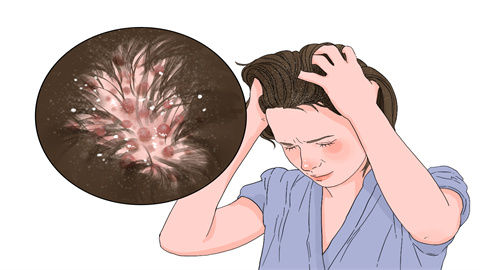Causes and Management of Excessive Dandruff
Excessive dandruff may be caused by improper cleansing, unbalanced diet, seborrheic dermatitis, psoriasis, or pityriasis capitis, and can be improved through general treatments, medication, and other methods. It is recommended to visit a hospital promptly and undergo treatment under a physician's guidance.

1. Improper cleansing: Prolonged periods without washing your hair can lead to bacterial growth and dandruff, while over-cleansing may damage the scalp barrier, causing dryness and increased skin flaking. It is recommended to wash your hair based on your hair type—oily hair every 2-3 days and dry hair every 3-4 days—and to choose a mild shampoo suitable for your needs.
2. Unbalanced diet: Long-term consumption of spicy, greasy, or high-sugar foods, such as chili peppers, fried foods, and cakes, can affect the body's metabolism, leading to abnormal sebum secretion and increased dandruff. Adjust your diet in daily life, consuming more foods rich in B vitamins and fresh fruits and vegetables to maintain a balanced diet.
3. Seborrheic dermatitis: Overactive sebaceous glands and excessive proliferation of Malassezia fungi can irritate the scalp, causing inflammation, oily scales, increased dandruff, and symptoms such as itching and redness. Patients can use antifungal shampoos like ketoconazole shampoo, selenium sulfide shampoo, or medications such as vitamin B6 tablets under a physician's guidance to alleviate symptoms.
4. Psoriasis: Genetic and immune factors can cause excessive proliferation of keratinocytes on the scalp, resulting in large amounts of white or silvery scales, thick dandruff, and symptoms such as itching and red patches. It is recommended to follow medical advice and use medications like tretinoin cream, calcipotriol ointment, or tacalcitol ointment to relieve discomfort.
5. Pityriasis capitis: Excessive sebum production by scalp sebaceous glands provides favorable conditions for the growth of Malassezia furfur, leading to pityriasis capitis, which presents as diffuse grayish-white, bran-like scales, increased dandruff, and mild itching. Patients can use medications like ketoconazole cream, coal tar shampoo, or sulfur ointment under medical guidance to improve symptoms.
In daily life, it is recommended to regularly use conditioners or scalp care products to maintain scalp health.
References:
[1] Lin Qiaoyin, Gao Ning, Yang Haifeng, et al. Clinical observation of external treatment with Chinese herbs for damp-heat type seborrheic dermatitis of the scalp[J]. Journal of Practical Traditional Chinese Medicine, 2024, 40(12): 2551-2553.
[2] Liu Qianhui, Zhao Fangshu, Peng Jiaming, et al. Current research on the causes and treatment methods of pityriasis capitis[J]. Shandong Chemical Industry, 2018, 47(17): 71-73. DOI: 10.19319/j.cnki.issn.1008-021x.2018.17.027.






